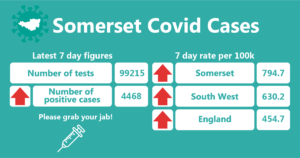Welcome to the latest edition of the weekly Somerset Covid-19 update for key stakeholders. This update is produced on behalf of the Somerset Covid-19 Engagement Board and is designed to provide a weekly update on the current Covid-19 situation in Somerset.
We have seen the number of cases of Covid-19 in Somerset rise significantly in the last week. The majority of our cases continue to be among school and college age children and also staff within education settings. For this reason, the section later in this update on school and college settings contains detailed information which needs to be taken into consideration as we are seeing the rises in school age cases having a knock-on effect within our communities.
In his press conference this week, Health Secretary Sajid Javid repeated his warning that Covid-19 cases continue to rise as the country enters a challenging winter period. He reminded the public this pandemic is not over, and whilst the link between hospitalisations and deaths has weakened, it is has not broken. This is a message we will very much be echoing in the coming weeks, we must all work together now to avoid what could be a very challenging winter period.
With half-term occurring next week for the majority of schools and our cases rising so rapidly, we want to get the message to people to enjoy their breaks and enjoy their activities, but to do so safely. We advise all Somerset residents and visitors to continue their testing routines and follow any advice they are given from schools, to be safe when on holiday – simple things such as testing before visiting friends and family, meeting in well ventilated places and taking up the offer of a vaccination are so important. And please wash your hands regularly, wear a face covering when in enclosed, busy areas and remember: do not go to visit others if you are showing any symptoms or feel unwell.
With Halloween and Bonfire night approaching soon, we will be reminding people of the important safety measures which should continue to be taken. Assets encouraging safe celebrations will be shared in next week’s update.
Finally, everyone affected by the recent Wolverhampton lab situation should now have received a text from the NHS Test and Trace asking them to re-test. Please note: from 1 November and there will be a reduction in the opening hours at regional and local testing sites. Instead of opening from 8am until 8pm, they will operate from 8am until 6pm – 2 hours less per day.
Latest Covid Dashboard: The following link below will take you to our website: Coronavirus (COVID-19) (somerset.gov.uk) Then scroll down the page until you get to ‘COVID-19 Dashboard’ in the list. Click on this and the dashboard will open.
‘Remember, everyone can catch it, anyone can spread it’.



| David Fothergill, Leader of Somerset County Council Twitter: @DJAFothergill | Trudi Grant, Director of Public Health Twitter: @SomersetDPH | Clare Paul, Cabinet Member for Public Health and Wellbeing Twitter: @Clarepaul_ |

In the week up to 16 October, approximately 99,215 tests were carried out across the county with 4,468 new confirmed cases. The rates have more than doubled in the last reporting week to 794.7 per 100.000, which is above the South-West and the national average.
Hospitalisation data for Somerset has increased to just over 60 Covid-19 in-patients in Somerset hospitals.
This Week’s Headlines
The main items featured in this week’s update are:
- Workplace, Care and School settings
- Vaccination and Covid Booster update
- Latest Covid Catch-up Film
- Resources and further information
Workplaces: Once again, with so many cases being seen in our education settings, it’s worth reminding staff who have a child in education to do a twice weekly lateral flow test, to avoid them bringing Covid-19 into the workplace. Find out more about what you can do to keep working safely to reduce the risk of transmission.
Last week we looked at why adequate ventilation is so important but as we move into the winter months, providing adequate ventilation does not mean people have to work in an uncomfortably chilly or cold workplace.
To increase the flow of air you can:
- Open windows as much as possible
- Open doors
- Make sure any vents (for example at the top of a window) are open and airflow is not blocked
- Leave extractor fans (for example in cloakrooms) running for longer than usual with the door closed after someone has used the room
Let fresh air in while keeping warm: Particular attention should be paid to ensure spaces can be effectively ventilated without significantly compromising the thermal comfort of occupants.
- You can relax dress codes so staff can wear warm clothes or layers if they are cold
- In colder weather opening the window a small amount can still help
- If windows have openings at both high and low levels (such as sash windows) using just the top opening can help avoid cold draughts
- If you’re concerned about noise, security or the costs of heating, opening windows for shorter periods of time can still help to reduce the risk of the virus spreading. This can be done while people leave the room for a break. For example, 10 minutes an hour can help reduce the risk from virus in the air, depending on the size of the room
- set the heating to maintain a comfortable temperature even when windows and doors are open
Where possible avoid fans, they are likely to add to the risk of the virus being spread. Room or desk fans don’t introduce fresh air, they just move it around. The key is to let fresh air in to dilute the virus concentration in the room. To find out more information, visit the Health and Safety Executive website.
Care Sector: We continue to see cases and outbreaks of Covid-19 in social care settings across Somerset. Now we are into Autumn and have Winter approaching, it is essential to reduce the risk of Covid-19 as well as other infections. It becomes ever more important to maintain Infection Prevention Control measures, regular testing, vaccination promotion, ventilation, monitoring and prompt action where infection is suspected, as well as promotion of health and wellbeing in our care sector.
Winter vaccinations
- Both Covid-19 booster vaccinations and flu vaccinations are available
- The Covid-19 vaccination national booking service can be accessed by frontline health and social care staff to book a booster vaccine appointment through self-referral for those who had their 2nd dose at least 6 months ago.
- Book online via NHS website or phone 119
- Winter vaccinations communications assets are available, including posters, social media graphics CARE: Winter vaccinations campaign assets | Campaign Resource Centre
Further information
More information about Covid-19 in care settings can be found on the Adult Social Care webpage.
Schools and Early Years settings: There are currently very high levels Covid-19 in Somerset. The Somerset rate between the 8th and 15th October is around 800 per 100,000 population. This is higher than both the regional South-West rate and national rates for the same time period.
The majority of our cases are among school and college age children and staff within education settings. We have the highest rates of cases among 10-14 year olds in the region and therefore we are focusing activity on our secondary schools.
Following an individual risk assessment of each school’s Covid-19 cases and local community transmission rates, each school will receive a letter from the Director of Public Health giving public health advice on the levels of control measures to be in place post half term. Although Covid-19 is frequently a mild illness for children, we are aware the high sickness rates are causing significant disruptions to children’s education, which we remain extremely concerned about.
Additionally, within each District in Somerset we have many cases of Covid-19 who have received false negative PCR test results as a result of the recent lab testing issue. This means cases wouldn’t have been isolating as they should have been and will have continued to spread Covid-19 within our schools and communities through no fault of their own.
It is for this reason that the SCC Public Health team have conducted individual risk assessments and advised educational settings on specific additional actions they can implement for the 14 days post half term. The proposed measures focus on:
- Introduce face coverings in communal areas, such as corridors, when movement occurs between lessons (for secondary school and college settings) and on school transport if used.
- Reducing mixing between groups of students as much as possible including consideration of pausing ‘whole school’ assemblies for the time being and other ‘large gatherings’.
- Promoting social distancing and reducing crowding where possible and minimising pinch points in the school day e.g. staggered lunch times or start times.
- Reinforcing social distancing and good infection prevention control (ventilation, touchpoint cleaning) amongst staff (and in areas where staff gather) as much as possible due to the large numbers of staff who are contracting the virus.
- As we are in an outbreak situation, any household contacts of confirmed cases of Covid-19 are advised to book a PCR test and whilst awaiting test results undertake daily LFD tests and only attend school if this is negative.
Public Health advice is that these measures are to be implemented in addition to other control measures already in place, such as twice weekly LFD testing for pupils (11+), households and staff, promotion of good hygiene measures, ventilation measures, enhanced cleaning regimens and the promotion of vaccination. This situation remains under constant review.
The measures are advised in accordance with the DfE contingency framework. The Regional Schools Commissioner, The Director of Children’s Services and UKHSA have been advised of this advice.
The requirement for children aged 11+ to complete two lateral flow tests at home remains as important as ever. From the 11th – 15th October there were 22,022 tests recorded by school age children with 410 positive, bringing the positivity rate down slightly to 1.9%. There has however, been a large increase in our positivity rate of PCRs during the same reporting period (now 16.6%).
Staff, students and pupils are being reminded to test twice weekly at home with LFD kits over the half term period, as well as testing at home the evening before they return to their educational setting.
Symptomatic and Asymptomatic Testing:
Parents or carers of a school or college age child, health, care or education staff are requested to undertake twice weekly asymptomatic testing using LFDs, so those you meet or work with are kept safe from infection.
PCR negative between 8th – 13th October
NHS Test and Trace have sent text messages to all of those who have been affected by the recent lab PCR testing issue, and who may still be infectious. If a pupil or staff member tested positive on LFD and subsequently tested negative on PCR, prior to the 13th of October, they will be advised to get a new PCR test at a testing centre, or via a home kit.
Current Advice:
If staff or a pupil is identified as a close contact by NHS Test and Trace, they may be asked to take daily lateral flow device (LFD) tests, while they wait for their PCR test result. In this scenario, the staff member or pupil should continue to attend school or college as long as their LFD test results remain negative and they feel well.
SCC PH advice remains consistent with national guidance:
- Only use twice weekly LFD testing for asymptomatic cases
- Make sure you do an LFD according to the instructions and at least 30 minutes after eating or drinking
- If you get a positive LFT or have symptoms get a PCR and use the supervised PCR testing route at test centre to get the best quality test
- Encourage secondary school age children to wear face coverings in crowded or enclosed places, for example on school transport
- Take up the offer of vaccination
Covid-19 Vaccine Programme for 12-15yr olds:
Getting the vaccine will help to protect children and young people against Covid-19. Whilst most children usually have mild illness, they can pass on their infection to others in their family and those they come into contact with. Getting vaccinated will also help to reduce the chance of disruption to their education from Covid-19. This is an important decision more information can be found on the GOV.uk website to help parents and young people make an informed decision.
The programme is being rolled out across some schools already in Somerset and schools will continue to be contacted by SAINT (Schools Immunisation programme) to arrange a date.
NHS Opens Online Covid-19 Vaccination Bookings For 12-15 Year Olds
Parents will be able to book Covid-19 vaccinations online for their 12-15 year old children from the end of today (Friday) with appointments available as soon as tomorrow, the NHS has announced.
People will be able to go online and check the National Booking Service to see if their local site has appointments to vaccinate children and young people, as the NHS Covid-19 vaccination programme continues at pace.
The booking service will provide an additional option for parents to book a vaccine for their child, alongside the schools’ programme which has already vaccinated nearly half a million young people and visited thousands of schools.
If a child has already been invited through their school, they do not need act on their invite unless parents wish to get their child vaccinated outside of school.
Parents and guardians will be advised to attend vaccination sites with their children if they want them to get jabbed outside of school hours and consent will be sought on the day. Parents and young people are being asked to read the patient information in advance of arriving for their appointment. This can also be accessed online.
The NHS has said that it is a new option for parents who may want to get their child vaccinated during half term.
Letters will be sent to parents and guardians of children aged 12 – 15 over the coming weeks inviting them to book the vaccine online or by calling 119 as the NHS Covid-19 vaccination programme continues at pace.
Vaccination Update: For the latest information about the Somerset vaccination programme please visit the NHS website.
More than 83 million vaccines have already been delivered and nearly nine in ten adults have had their first dose since the NHS in England made history when Margaret Keenan received the first jab outside of a clinical trial in Coventry, in December 2020.
There are still around 60,000 adults in Somerset who have not taken up the offer of a first dose. These are mainly in our larger towns and this pattern of slower uptake is seen in the same towns also with the second dose. With concern rising both locally and nationally we would urge all unvaccinated adults to come forward for vaccination for both doses.
The numbers of 16-17 years taking up their first dose is slowly increasing but we are still 3,000 individuals short to be on equal terms with the first dose rate in our adult population. It’s very important we continue to encourage 16-17 years to come forward. Visit the NHS website for more information.
Covid-19 Booster Vaccine Rollout:
The NHS booster vaccine rollout is also well underway with more than four million people nationally already receiving the important top-up jab ahead of winter in just four weeks since the JCVI updated its guidance.
Anyone receiving a text or letter inviting them for a booster jab should come forward as soon as possible to get crucial protection.
As stated last week, and as a reminder – please do not contact your GP about this, you will be contacted when you become eligible for the jab, which is six months after your second dose. You will get a call, text or letter from your local GP led site to get the jab, or will be invited by the National Booking Service. Please note you are only able to book your booster jab once it has been over 181 days since your second vaccine dose. Therefore, the invite may arrive before you are eligible to book and you may have to wait a period until those 181 days are met.
Those who are eligible for the Covid-19 booster jabs include:
- those living in residential care homes for older adults
- all adults aged 50 years or over
- frontline health and social care workers
- all those aged 16 to 49 years with underlying health conditions which put them at higher risk of severe Covid-19 (as set out in the green book), and adult carers
- adult household contacts of immunosuppressed individuals
Also, locally, they will be repeating the outreach work in Somerset for the hard-to-access groups for their boosters – this will start in November.
Visit the NHS website for more information on the Somerset Covid-19 Vaccination programme.
It remains very important for anyone who has not had their first or second dose of the Covid-19 vaccine, to do so as soon as possible. While the first dose starts to provide some immunity, it is only two weeks after the second dose when you are considered to be ‘fully vaccinated’.
Covid Catch-up Film: In this weeks’ film, Director of Public Health Trudi Grant emphasises the importance regular LFD testing and confirmatory PCR testing play in protecting young people and keeping their education moving forwards. Watch the film on YouTube.
Resources and further information: Please do keep an eye our Healthy Somerset website, which has a huge amount of information and resources to help keep everyone healthy happy and safe at this time.
For the latest local information as well as digital resources, posters and flyers please visit the Somerset County Council website.
The Somerset Local Outbreak Management Plan outlines how we, the council, will work with the NHS Test and Trace Service, PHE, the NHS and other partners to ensure a whole system approach to preventing and managing local outbreaks. This can be found here.
Finally, please like them on Facebook, follow them on Twitter and share their posts with your networks to help them in communicating these important messages. Follow their Director of Public Health Twitter account too.

